A Comprehensive Report on Sugar's Impact on Cardiovascular Health
VerifiedAdded on 2023/06/13
|11
|2423
|92
Report
AI Summary
This report investigates the connection between sugar consumption and the increased risk of heart disease. It examines the mechanisms through which sugar impacts cardiovascular health, including the effects of sugar-sweetened beverages, fructose, and sucrose on factors like blood glucose lev...
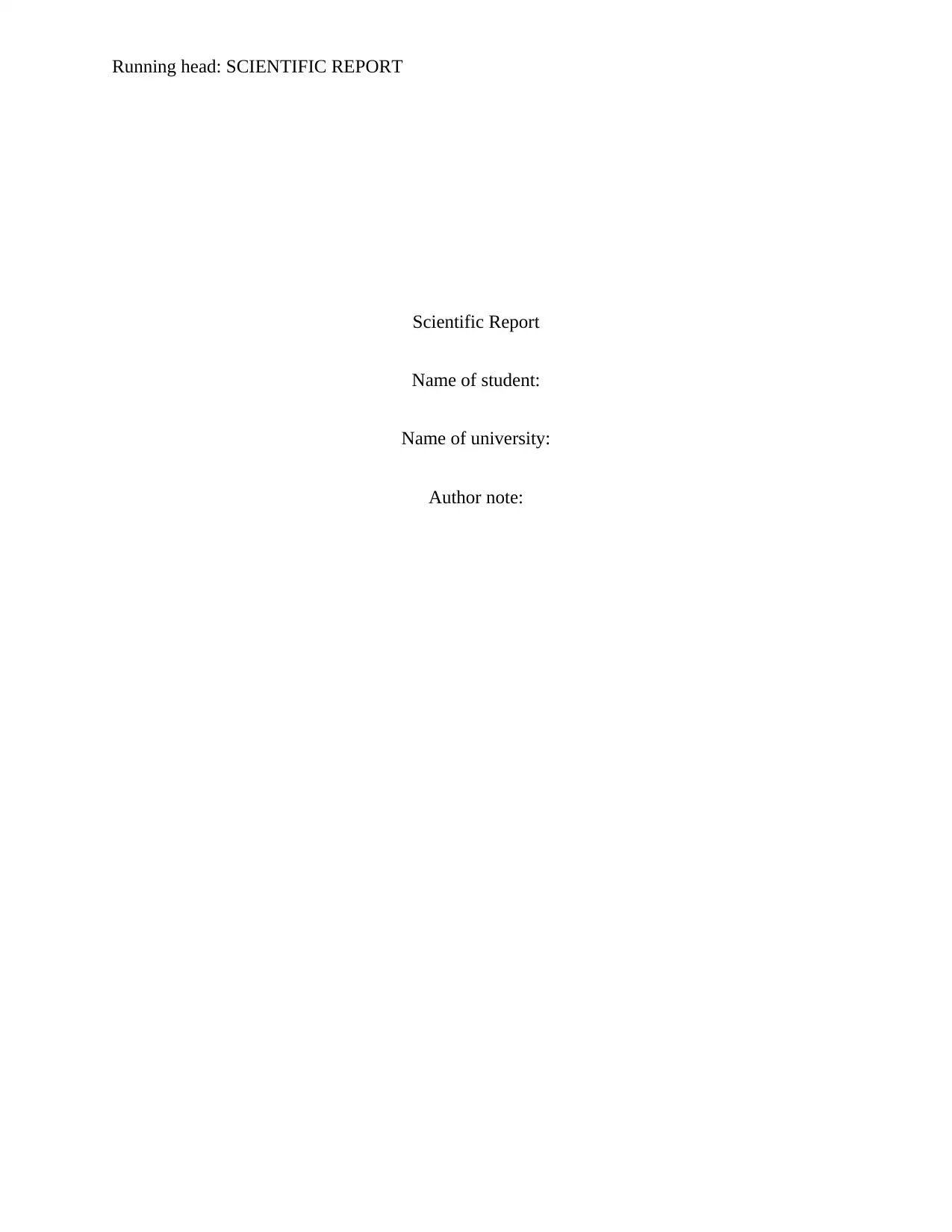
Running head: SCIENTIFIC REPORT
Scientific Report
Name of student:
Name of university:
Author note:
Scientific Report
Name of student:
Name of university:
Author note:
Paraphrase This Document
Need a fresh take? Get an instant paraphrase of this document with our AI Paraphraser
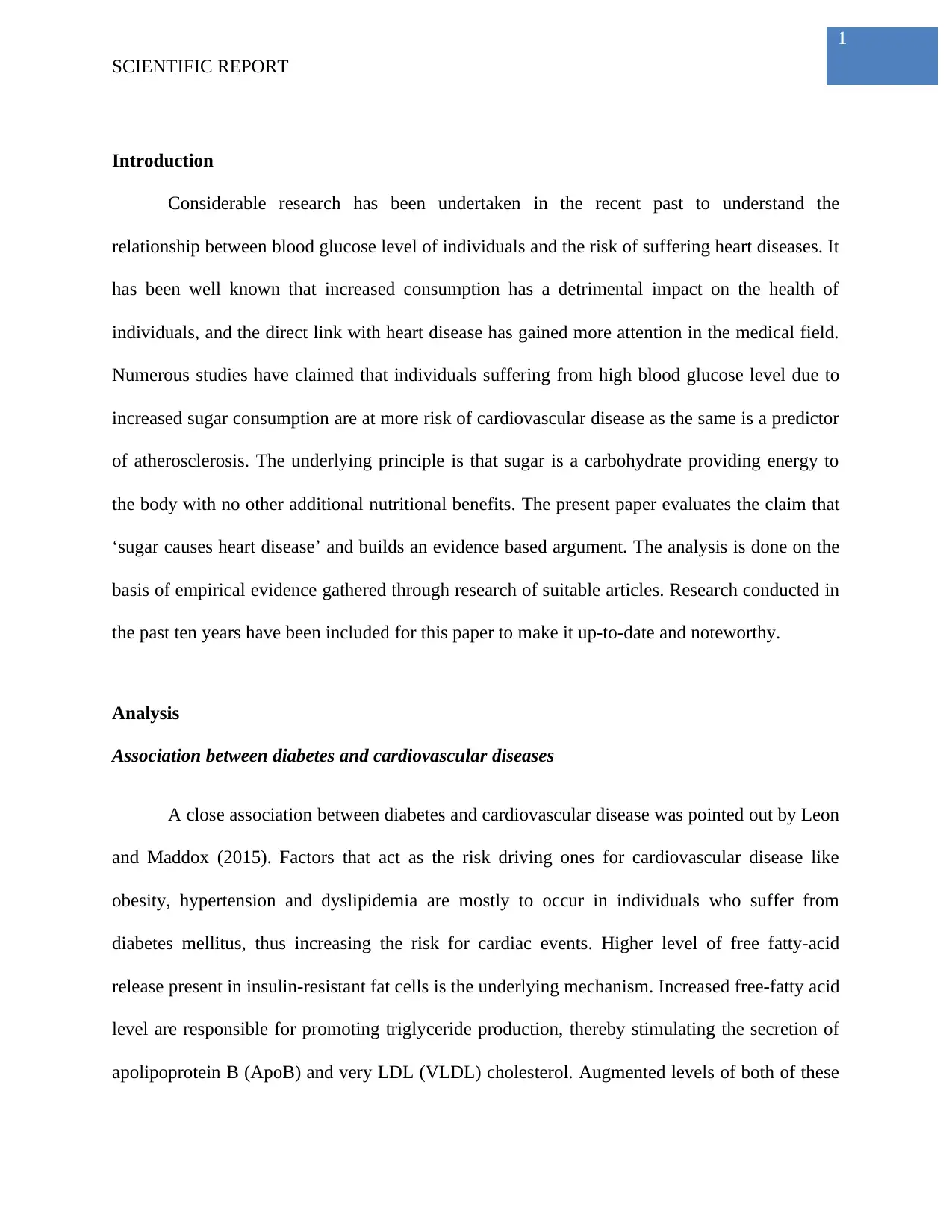
1
SCIENTIFIC REPORT
Introduction
Considerable research has been undertaken in the recent past to understand the
relationship between blood glucose level of individuals and the risk of suffering heart diseases. It
has been well known that increased consumption has a detrimental impact on the health of
individuals, and the direct link with heart disease has gained more attention in the medical field.
Numerous studies have claimed that individuals suffering from high blood glucose level due to
increased sugar consumption are at more risk of cardiovascular disease as the same is a predictor
of atherosclerosis. The underlying principle is that sugar is a carbohydrate providing energy to
the body with no other additional nutritional benefits. The present paper evaluates the claim that
‘sugar causes heart disease’ and builds an evidence based argument. The analysis is done on the
basis of empirical evidence gathered through research of suitable articles. Research conducted in
the past ten years have been included for this paper to make it up-to-date and noteworthy.
Analysis
Association between diabetes and cardiovascular diseases
A close association between diabetes and cardiovascular disease was pointed out by Leon
and Maddox (2015). Factors that act as the risk driving ones for cardiovascular disease like
obesity, hypertension and dyslipidemia are mostly to occur in individuals who suffer from
diabetes mellitus, thus increasing the risk for cardiac events. Higher level of free fatty-acid
release present in insulin-resistant fat cells is the underlying mechanism. Increased free-fatty acid
level are responsible for promoting triglyceride production, thereby stimulating the secretion of
apolipoprotein B (ApoB) and very LDL (VLDL) cholesterol. Augmented levels of both of these
SCIENTIFIC REPORT
Introduction
Considerable research has been undertaken in the recent past to understand the
relationship between blood glucose level of individuals and the risk of suffering heart diseases. It
has been well known that increased consumption has a detrimental impact on the health of
individuals, and the direct link with heart disease has gained more attention in the medical field.
Numerous studies have claimed that individuals suffering from high blood glucose level due to
increased sugar consumption are at more risk of cardiovascular disease as the same is a predictor
of atherosclerosis. The underlying principle is that sugar is a carbohydrate providing energy to
the body with no other additional nutritional benefits. The present paper evaluates the claim that
‘sugar causes heart disease’ and builds an evidence based argument. The analysis is done on the
basis of empirical evidence gathered through research of suitable articles. Research conducted in
the past ten years have been included for this paper to make it up-to-date and noteworthy.
Analysis
Association between diabetes and cardiovascular diseases
A close association between diabetes and cardiovascular disease was pointed out by Leon
and Maddox (2015). Factors that act as the risk driving ones for cardiovascular disease like
obesity, hypertension and dyslipidemia are mostly to occur in individuals who suffer from
diabetes mellitus, thus increasing the risk for cardiac events. Higher level of free fatty-acid
release present in insulin-resistant fat cells is the underlying mechanism. Increased free-fatty acid
level are responsible for promoting triglyceride production, thereby stimulating the secretion of
apolipoprotein B (ApoB) and very LDL (VLDL) cholesterol. Augmented levels of both of these
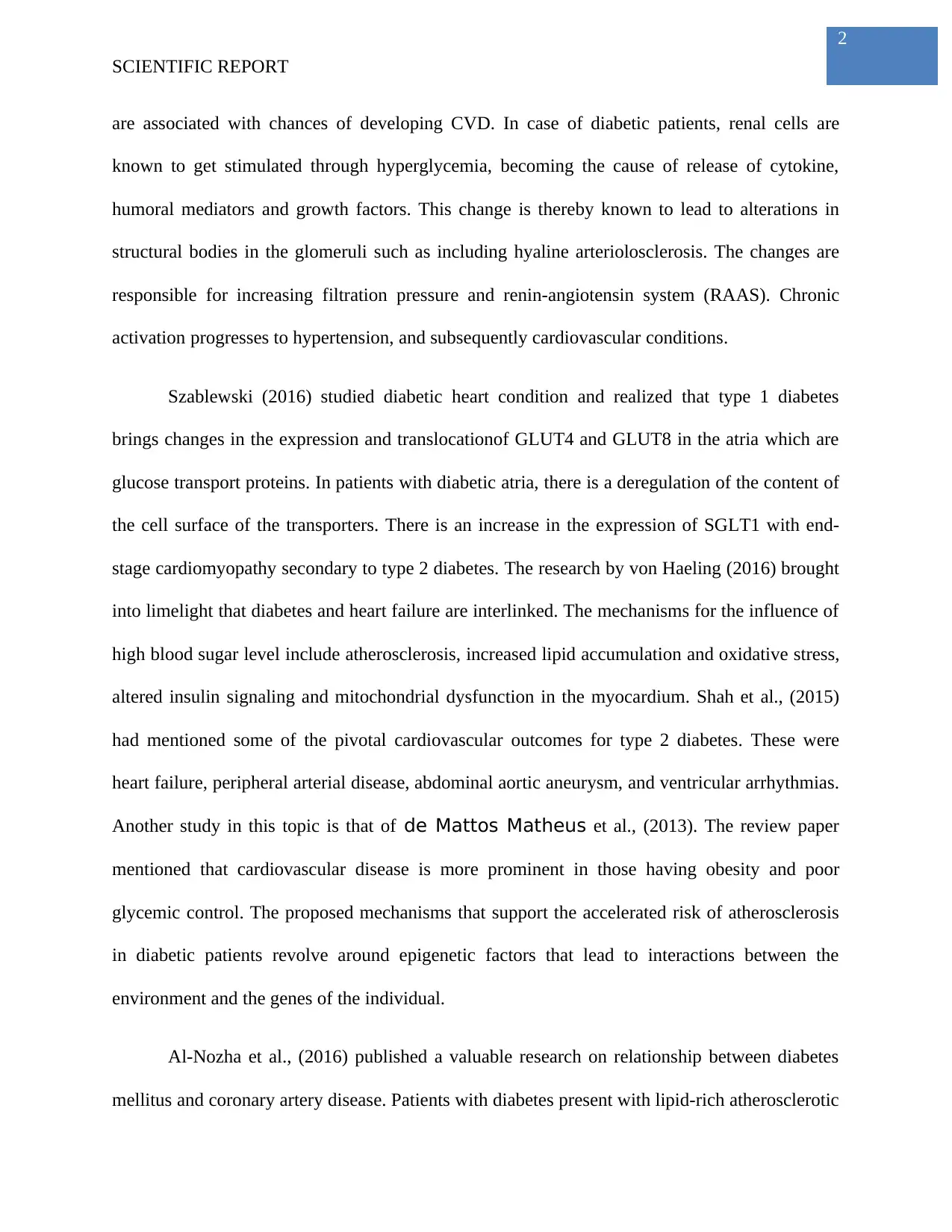
2
SCIENTIFIC REPORT
are associated with chances of developing CVD. In case of diabetic patients, renal cells are
known to get stimulated through hyperglycemia, becoming the cause of release of cytokine,
humoral mediators and growth factors. This change is thereby known to lead to alterations in
structural bodies in the glomeruli such as including hyaline arteriolosclerosis. The changes are
responsible for increasing filtration pressure and renin-angiotensin system (RAAS). Chronic
activation progresses to hypertension, and subsequently cardiovascular conditions.
Szablewski (2016) studied diabetic heart condition and realized that type 1 diabetes
brings changes in the expression and translocationof GLUT4 and GLUT8 in the atria which are
glucose transport proteins. In patients with diabetic atria, there is a deregulation of the content of
the cell surface of the transporters. There is an increase in the expression of SGLT1 with end-
stage cardiomyopathy secondary to type 2 diabetes. The research by von Haeling (2016) brought
into limelight that diabetes and heart failure are interlinked. The mechanisms for the influence of
high blood sugar level include atherosclerosis, increased lipid accumulation and oxidative stress,
altered insulin signaling and mitochondrial dysfunction in the myocardium. Shah et al., (2015)
had mentioned some of the pivotal cardiovascular outcomes for type 2 diabetes. These were
heart failure, peripheral arterial disease, abdominal aortic aneurysm, and ventricular arrhythmias.
Another study in this topic is that of de Mattos Matheus et al., (2013). The review paper
mentioned that cardiovascular disease is more prominent in those having obesity and poor
glycemic control. The proposed mechanisms that support the accelerated risk of atherosclerosis
in diabetic patients revolve around epigenetic factors that lead to interactions between the
environment and the genes of the individual.
Al-Nozha et al., (2016) published a valuable research on relationship between diabetes
mellitus and coronary artery disease. Patients with diabetes present with lipid-rich atherosclerotic
SCIENTIFIC REPORT
are associated with chances of developing CVD. In case of diabetic patients, renal cells are
known to get stimulated through hyperglycemia, becoming the cause of release of cytokine,
humoral mediators and growth factors. This change is thereby known to lead to alterations in
structural bodies in the glomeruli such as including hyaline arteriolosclerosis. The changes are
responsible for increasing filtration pressure and renin-angiotensin system (RAAS). Chronic
activation progresses to hypertension, and subsequently cardiovascular conditions.
Szablewski (2016) studied diabetic heart condition and realized that type 1 diabetes
brings changes in the expression and translocationof GLUT4 and GLUT8 in the atria which are
glucose transport proteins. In patients with diabetic atria, there is a deregulation of the content of
the cell surface of the transporters. There is an increase in the expression of SGLT1 with end-
stage cardiomyopathy secondary to type 2 diabetes. The research by von Haeling (2016) brought
into limelight that diabetes and heart failure are interlinked. The mechanisms for the influence of
high blood sugar level include atherosclerosis, increased lipid accumulation and oxidative stress,
altered insulin signaling and mitochondrial dysfunction in the myocardium. Shah et al., (2015)
had mentioned some of the pivotal cardiovascular outcomes for type 2 diabetes. These were
heart failure, peripheral arterial disease, abdominal aortic aneurysm, and ventricular arrhythmias.
Another study in this topic is that of de Mattos Matheus et al., (2013). The review paper
mentioned that cardiovascular disease is more prominent in those having obesity and poor
glycemic control. The proposed mechanisms that support the accelerated risk of atherosclerosis
in diabetic patients revolve around epigenetic factors that lead to interactions between the
environment and the genes of the individual.
Al-Nozha et al., (2016) published a valuable research on relationship between diabetes
mellitus and coronary artery disease. Patients with diabetes present with lipid-rich atherosclerotic
⊘ This is a preview!⊘
Do you want full access?
Subscribe today to unlock all pages.

Trusted by 1+ million students worldwide
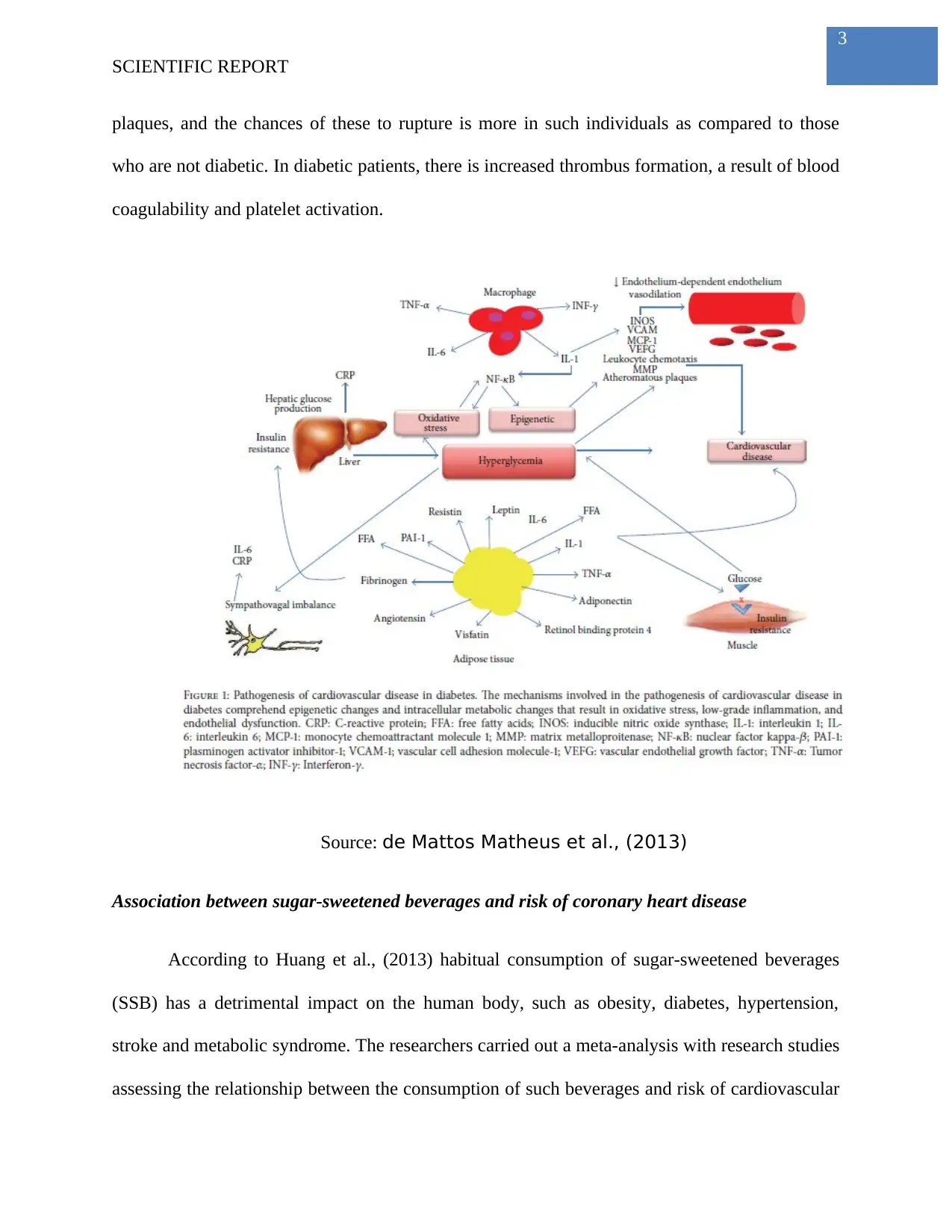
3
SCIENTIFIC REPORT
plaques, and the chances of these to rupture is more in such individuals as compared to those
who are not diabetic. In diabetic patients, there is increased thrombus formation, a result of blood
coagulability and platelet activation.
Source: de Mattos Matheus et al., (2013)
Association between sugar-sweetened beverages and risk of coronary heart disease
According to Huang et al., (2013) habitual consumption of sugar-sweetened beverages
(SSB) has a detrimental impact on the human body, such as obesity, diabetes, hypertension,
stroke and metabolic syndrome. The researchers carried out a meta-analysis with research studies
assessing the relationship between the consumption of such beverages and risk of cardiovascular
SCIENTIFIC REPORT
plaques, and the chances of these to rupture is more in such individuals as compared to those
who are not diabetic. In diabetic patients, there is increased thrombus formation, a result of blood
coagulability and platelet activation.
Source: de Mattos Matheus et al., (2013)
Association between sugar-sweetened beverages and risk of coronary heart disease
According to Huang et al., (2013) habitual consumption of sugar-sweetened beverages
(SSB) has a detrimental impact on the human body, such as obesity, diabetes, hypertension,
stroke and metabolic syndrome. The researchers carried out a meta-analysis with research studies
assessing the relationship between the consumption of such beverages and risk of cardiovascular
Paraphrase This Document
Need a fresh take? Get an instant paraphrase of this document with our AI Paraphraser
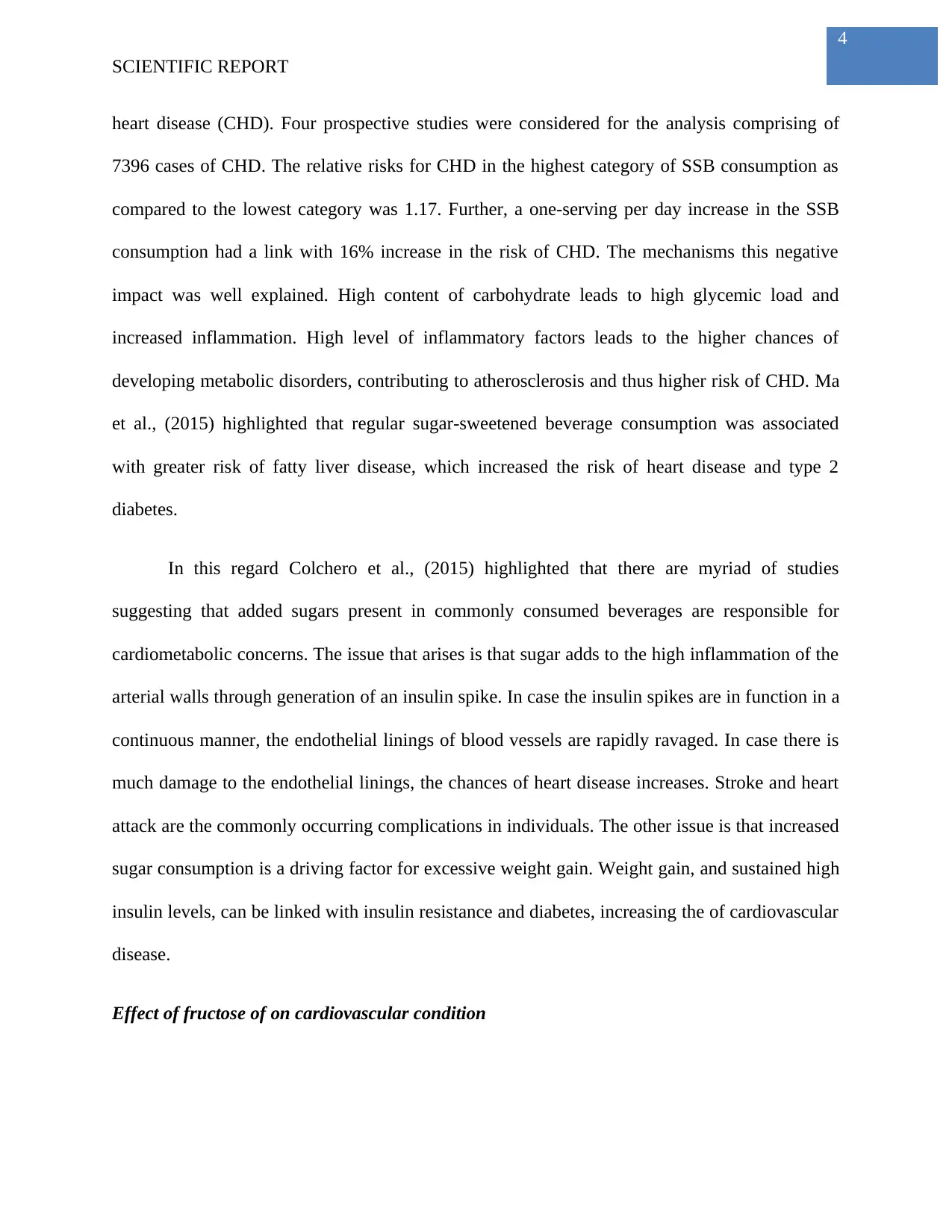
4
SCIENTIFIC REPORT
heart disease (CHD). Four prospective studies were considered for the analysis comprising of
7396 cases of CHD. The relative risks for CHD in the highest category of SSB consumption as
compared to the lowest category was 1.17. Further, a one-serving per day increase in the SSB
consumption had a link with 16% increase in the risk of CHD. The mechanisms this negative
impact was well explained. High content of carbohydrate leads to high glycemic load and
increased inflammation. High level of inflammatory factors leads to the higher chances of
developing metabolic disorders, contributing to atherosclerosis and thus higher risk of CHD. Ma
et al., (2015) highlighted that regular sugar-sweetened beverage consumption was associated
with greater risk of fatty liver disease, which increased the risk of heart disease and type 2
diabetes.
In this regard Colchero et al., (2015) highlighted that there are myriad of studies
suggesting that added sugars present in commonly consumed beverages are responsible for
cardiometabolic concerns. The issue that arises is that sugar adds to the high inflammation of the
arterial walls through generation of an insulin spike. In case the insulin spikes are in function in a
continuous manner, the endothelial linings of blood vessels are rapidly ravaged. In case there is
much damage to the endothelial linings, the chances of heart disease increases. Stroke and heart
attack are the commonly occurring complications in individuals. The other issue is that increased
sugar consumption is a driving factor for excessive weight gain. Weight gain, and sustained high
insulin levels, can be linked with insulin resistance and diabetes, increasing the of cardiovascular
disease.
Effect of fructose of on cardiovascular condition
SCIENTIFIC REPORT
heart disease (CHD). Four prospective studies were considered for the analysis comprising of
7396 cases of CHD. The relative risks for CHD in the highest category of SSB consumption as
compared to the lowest category was 1.17. Further, a one-serving per day increase in the SSB
consumption had a link with 16% increase in the risk of CHD. The mechanisms this negative
impact was well explained. High content of carbohydrate leads to high glycemic load and
increased inflammation. High level of inflammatory factors leads to the higher chances of
developing metabolic disorders, contributing to atherosclerosis and thus higher risk of CHD. Ma
et al., (2015) highlighted that regular sugar-sweetened beverage consumption was associated
with greater risk of fatty liver disease, which increased the risk of heart disease and type 2
diabetes.
In this regard Colchero et al., (2015) highlighted that there are myriad of studies
suggesting that added sugars present in commonly consumed beverages are responsible for
cardiometabolic concerns. The issue that arises is that sugar adds to the high inflammation of the
arterial walls through generation of an insulin spike. In case the insulin spikes are in function in a
continuous manner, the endothelial linings of blood vessels are rapidly ravaged. In case there is
much damage to the endothelial linings, the chances of heart disease increases. Stroke and heart
attack are the commonly occurring complications in individuals. The other issue is that increased
sugar consumption is a driving factor for excessive weight gain. Weight gain, and sustained high
insulin levels, can be linked with insulin resistance and diabetes, increasing the of cardiovascular
disease.
Effect of fructose of on cardiovascular condition
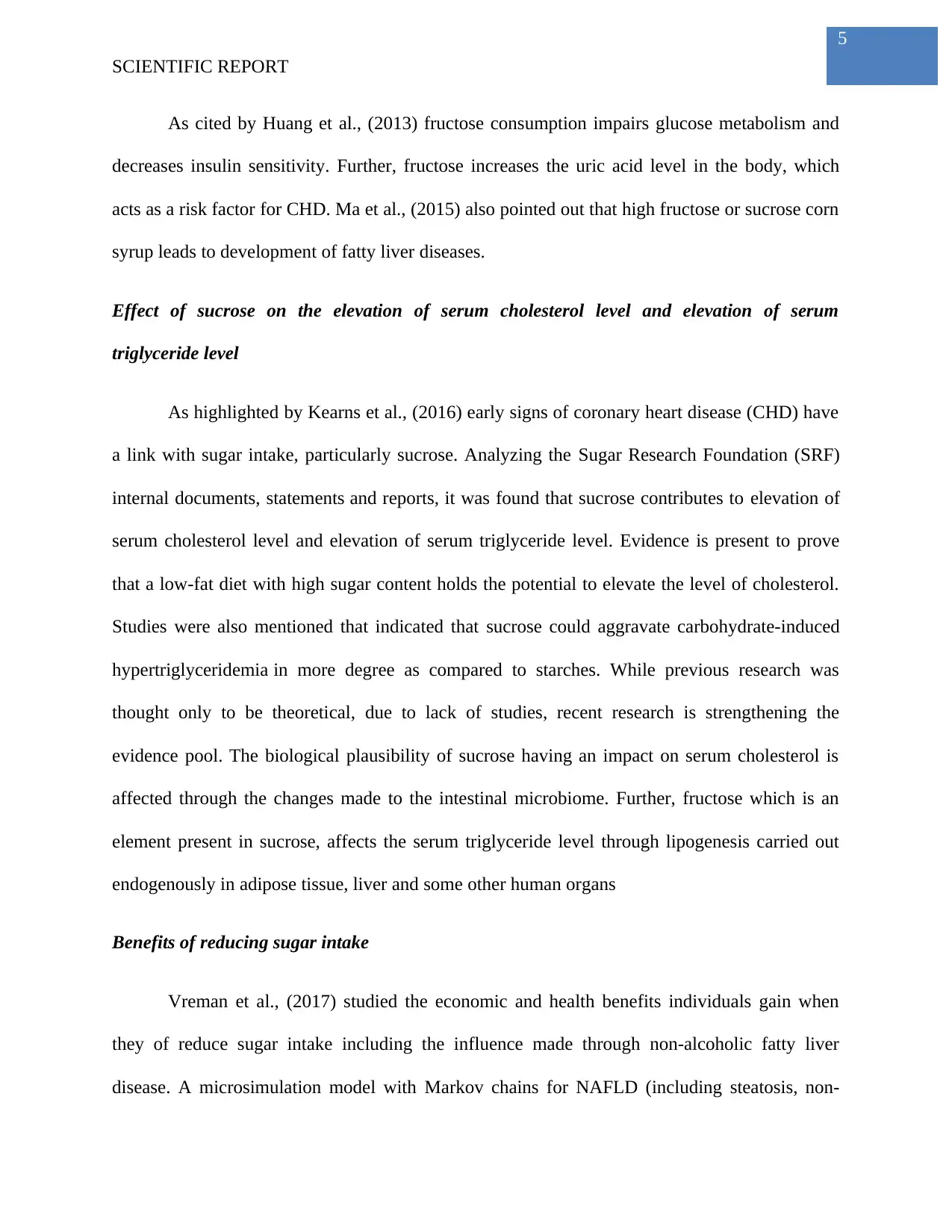
5
SCIENTIFIC REPORT
As cited by Huang et al., (2013) fructose consumption impairs glucose metabolism and
decreases insulin sensitivity. Further, fructose increases the uric acid level in the body, which
acts as a risk factor for CHD. Ma et al., (2015) also pointed out that high fructose or sucrose corn
syrup leads to development of fatty liver diseases.
Effect of sucrose on the elevation of serum cholesterol level and elevation of serum
triglyceride level
As highlighted by Kearns et al., (2016) early signs of coronary heart disease (CHD) have
a link with sugar intake, particularly sucrose. Analyzing the Sugar Research Foundation (SRF)
internal documents, statements and reports, it was found that sucrose contributes to elevation of
serum cholesterol level and elevation of serum triglyceride level. Evidence is present to prove
that a low-fat diet with high sugar content holds the potential to elevate the level of cholesterol.
Studies were also mentioned that indicated that sucrose could aggravate carbohydrate-induced
hypertriglyceridemia in more degree as compared to starches. While previous research was
thought only to be theoretical, due to lack of studies, recent research is strengthening the
evidence pool. The biological plausibility of sucrose having an impact on serum cholesterol is
affected through the changes made to the intestinal microbiome. Further, fructose which is an
element present in sucrose, affects the serum triglyceride level through lipogenesis carried out
endogenously in adipose tissue, liver and some other human organs
Benefits of reducing sugar intake
Vreman et al., (2017) studied the economic and health benefits individuals gain when
they of reduce sugar intake including the influence made through non-alcoholic fatty liver
disease. A microsimulation model with Markov chains for NAFLD (including steatosis, non-
SCIENTIFIC REPORT
As cited by Huang et al., (2013) fructose consumption impairs glucose metabolism and
decreases insulin sensitivity. Further, fructose increases the uric acid level in the body, which
acts as a risk factor for CHD. Ma et al., (2015) also pointed out that high fructose or sucrose corn
syrup leads to development of fatty liver diseases.
Effect of sucrose on the elevation of serum cholesterol level and elevation of serum
triglyceride level
As highlighted by Kearns et al., (2016) early signs of coronary heart disease (CHD) have
a link with sugar intake, particularly sucrose. Analyzing the Sugar Research Foundation (SRF)
internal documents, statements and reports, it was found that sucrose contributes to elevation of
serum cholesterol level and elevation of serum triglyceride level. Evidence is present to prove
that a low-fat diet with high sugar content holds the potential to elevate the level of cholesterol.
Studies were also mentioned that indicated that sucrose could aggravate carbohydrate-induced
hypertriglyceridemia in more degree as compared to starches. While previous research was
thought only to be theoretical, due to lack of studies, recent research is strengthening the
evidence pool. The biological plausibility of sucrose having an impact on serum cholesterol is
affected through the changes made to the intestinal microbiome. Further, fructose which is an
element present in sucrose, affects the serum triglyceride level through lipogenesis carried out
endogenously in adipose tissue, liver and some other human organs
Benefits of reducing sugar intake
Vreman et al., (2017) studied the economic and health benefits individuals gain when
they of reduce sugar intake including the influence made through non-alcoholic fatty liver
disease. A microsimulation model with Markov chains for NAFLD (including steatosis, non-
⊘ This is a preview!⊘
Do you want full access?
Subscribe today to unlock all pages.

Trusted by 1+ million students worldwide
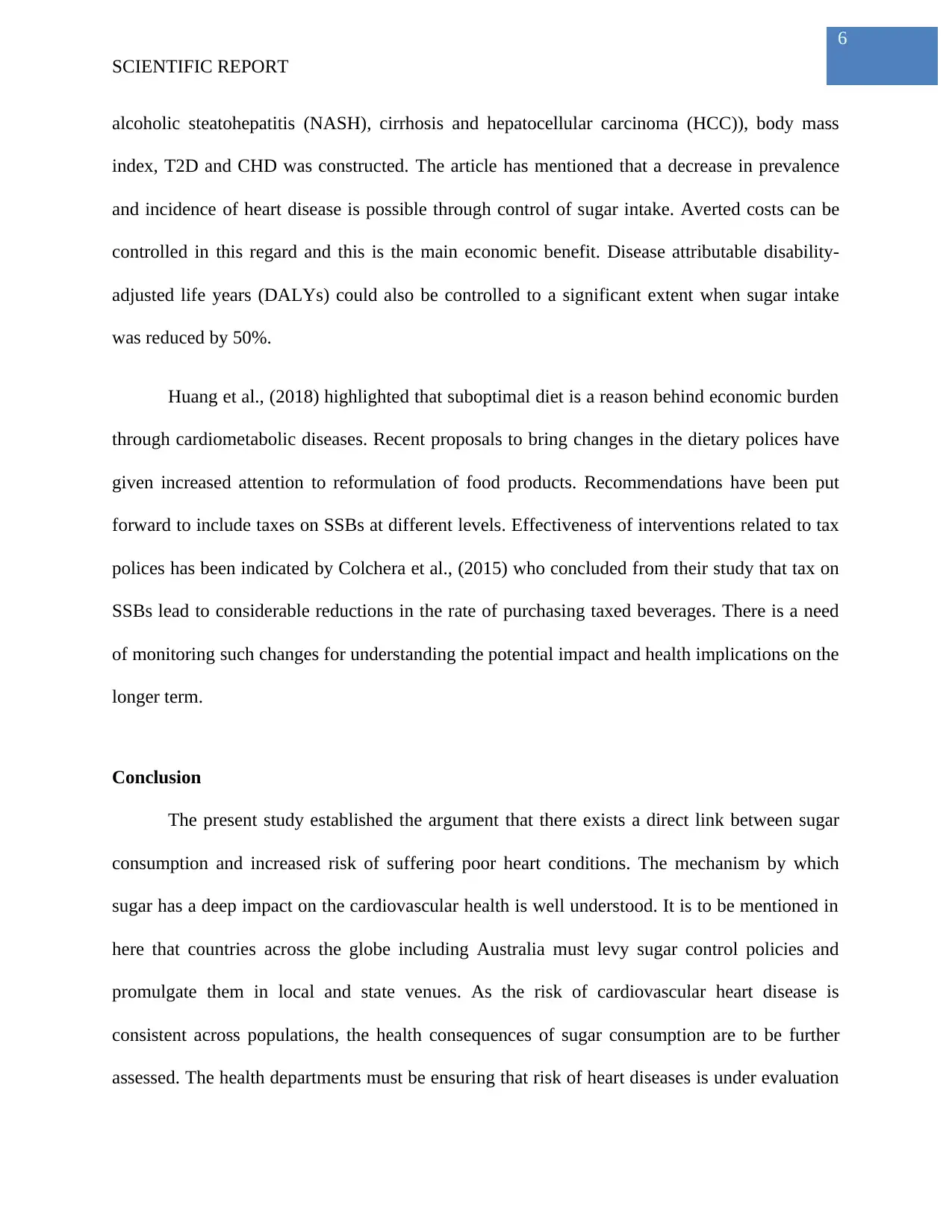
6
SCIENTIFIC REPORT
alcoholic steatohepatitis (NASH), cirrhosis and hepatocellular carcinoma (HCC)), body mass
index, T2D and CHD was constructed. The article has mentioned that a decrease in prevalence
and incidence of heart disease is possible through control of sugar intake. Averted costs can be
controlled in this regard and this is the main economic benefit. Disease attributable disability-
adjusted life years (DALYs) could also be controlled to a significant extent when sugar intake
was reduced by 50%.
Huang et al., (2018) highlighted that suboptimal diet is a reason behind economic burden
through cardiometabolic diseases. Recent proposals to bring changes in the dietary polices have
given increased attention to reformulation of food products. Recommendations have been put
forward to include taxes on SSBs at different levels. Effectiveness of interventions related to tax
polices has been indicated by Colchera et al., (2015) who concluded from their study that tax on
SSBs lead to considerable reductions in the rate of purchasing taxed beverages. There is a need
of monitoring such changes for understanding the potential impact and health implications on the
longer term.
Conclusion
The present study established the argument that there exists a direct link between sugar
consumption and increased risk of suffering poor heart conditions. The mechanism by which
sugar has a deep impact on the cardiovascular health is well understood. It is to be mentioned in
here that countries across the globe including Australia must levy sugar control policies and
promulgate them in local and state venues. As the risk of cardiovascular heart disease is
consistent across populations, the health consequences of sugar consumption are to be further
assessed. The health departments must be ensuring that risk of heart diseases is under evaluation
SCIENTIFIC REPORT
alcoholic steatohepatitis (NASH), cirrhosis and hepatocellular carcinoma (HCC)), body mass
index, T2D and CHD was constructed. The article has mentioned that a decrease in prevalence
and incidence of heart disease is possible through control of sugar intake. Averted costs can be
controlled in this regard and this is the main economic benefit. Disease attributable disability-
adjusted life years (DALYs) could also be controlled to a significant extent when sugar intake
was reduced by 50%.
Huang et al., (2018) highlighted that suboptimal diet is a reason behind economic burden
through cardiometabolic diseases. Recent proposals to bring changes in the dietary polices have
given increased attention to reformulation of food products. Recommendations have been put
forward to include taxes on SSBs at different levels. Effectiveness of interventions related to tax
polices has been indicated by Colchera et al., (2015) who concluded from their study that tax on
SSBs lead to considerable reductions in the rate of purchasing taxed beverages. There is a need
of monitoring such changes for understanding the potential impact and health implications on the
longer term.
Conclusion
The present study established the argument that there exists a direct link between sugar
consumption and increased risk of suffering poor heart conditions. The mechanism by which
sugar has a deep impact on the cardiovascular health is well understood. It is to be mentioned in
here that countries across the globe including Australia must levy sugar control policies and
promulgate them in local and state venues. As the risk of cardiovascular heart disease is
consistent across populations, the health consequences of sugar consumption are to be further
assessed. The health departments must be ensuring that risk of heart diseases is under evaluation
Paraphrase This Document
Need a fresh take? Get an instant paraphrase of this document with our AI Paraphraser
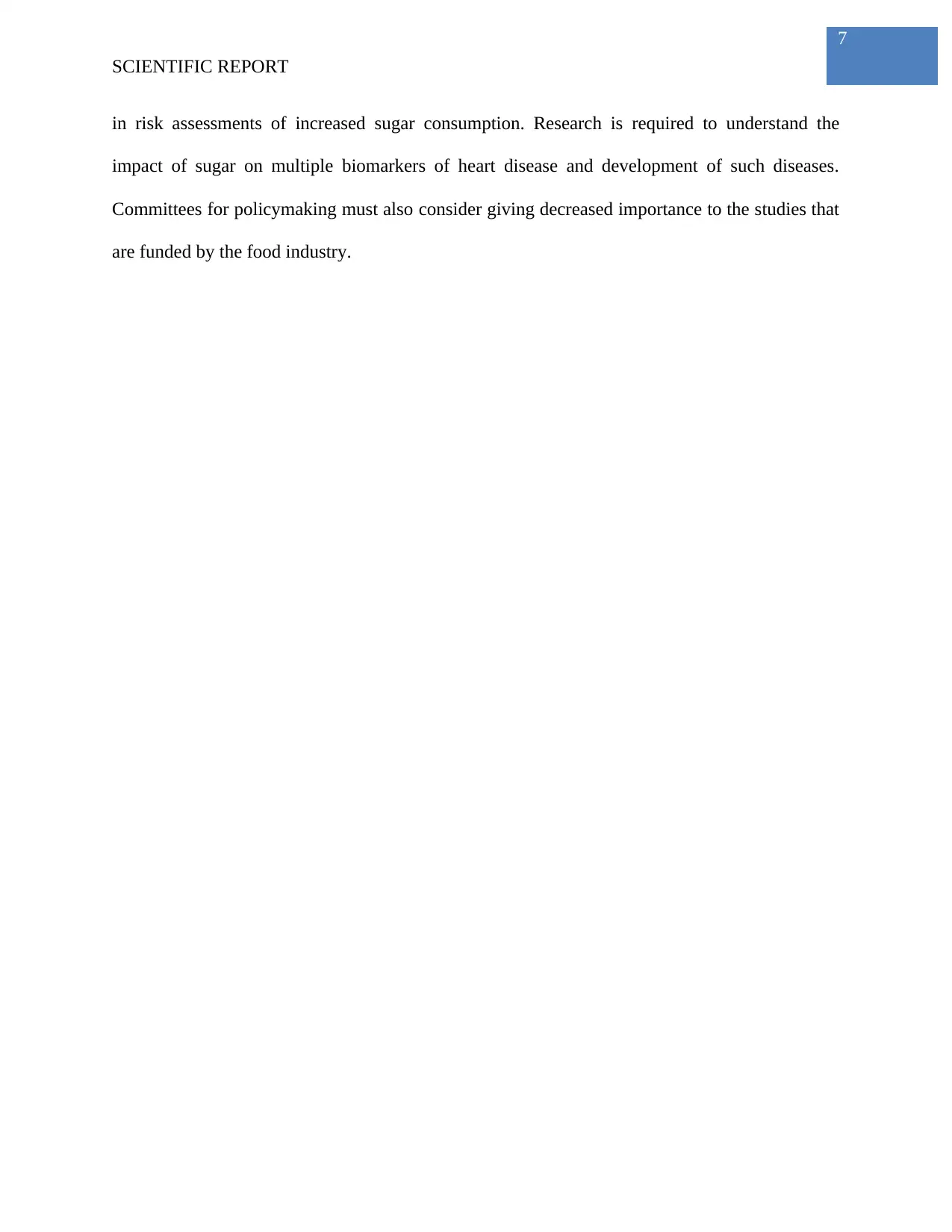
7
SCIENTIFIC REPORT
in risk assessments of increased sugar consumption. Research is required to understand the
impact of sugar on multiple biomarkers of heart disease and development of such diseases.
Committees for policymaking must also consider giving decreased importance to the studies that
are funded by the food industry.
SCIENTIFIC REPORT
in risk assessments of increased sugar consumption. Research is required to understand the
impact of sugar on multiple biomarkers of heart disease and development of such diseases.
Committees for policymaking must also consider giving decreased importance to the studies that
are funded by the food industry.
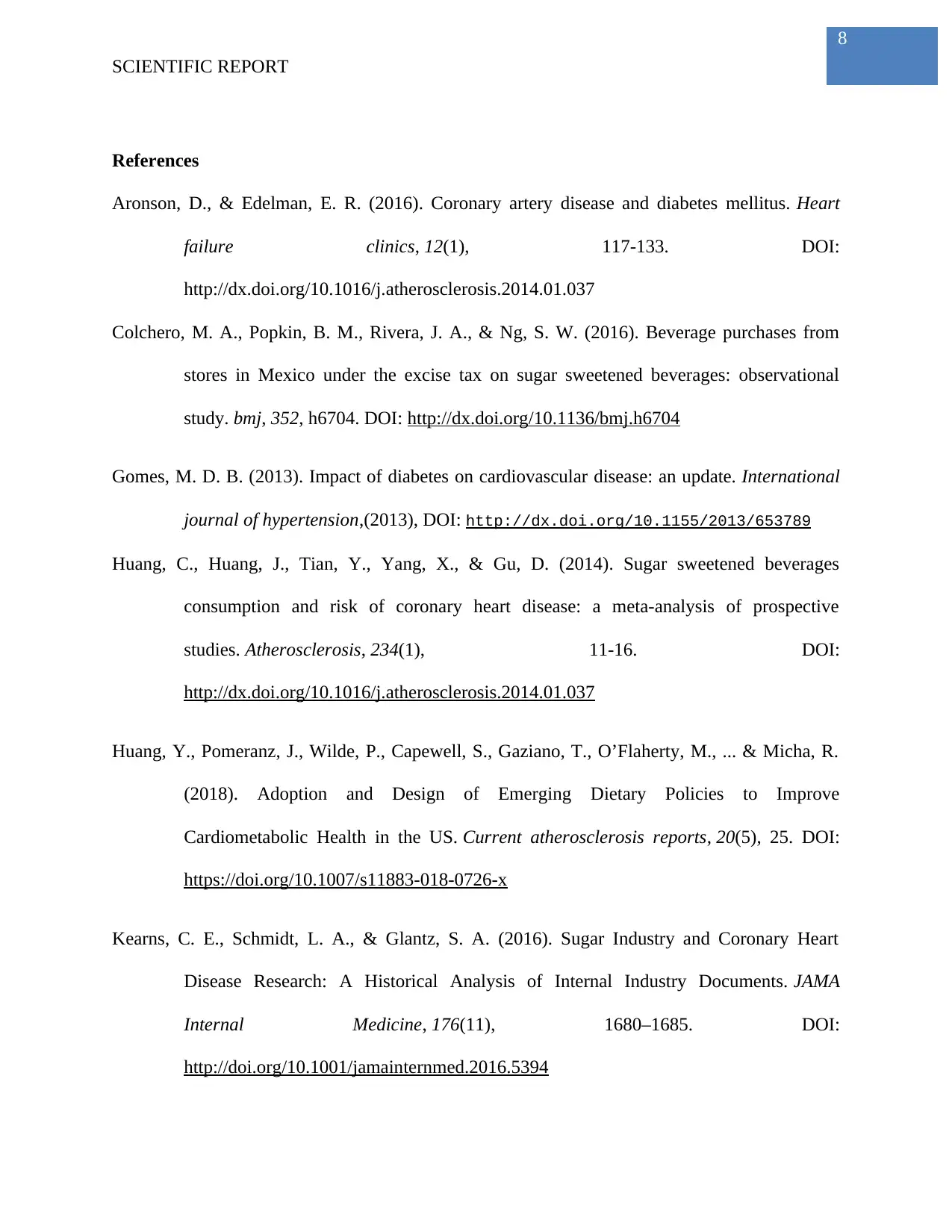
8
SCIENTIFIC REPORT
References
Aronson, D., & Edelman, E. R. (2016). Coronary artery disease and diabetes mellitus. Heart
failure clinics, 12(1), 117-133. DOI:
http://dx.doi.org/10.1016/j.atherosclerosis.2014.01.037
Colchero, M. A., Popkin, B. M., Rivera, J. A., & Ng, S. W. (2016). Beverage purchases from
stores in Mexico under the excise tax on sugar sweetened beverages: observational
study. bmj, 352, h6704. DOI: http://dx.doi.org/10.1136/bmj.h6704
Gomes, M. D. B. (2013). Impact of diabetes on cardiovascular disease: an update. International
journal of hypertension,(2013), DOI: http://dx.doi.org/10.1155/2013/653789
Huang, C., Huang, J., Tian, Y., Yang, X., & Gu, D. (2014). Sugar sweetened beverages
consumption and risk of coronary heart disease: a meta-analysis of prospective
studies. Atherosclerosis, 234(1), 11-16. DOI:
http://dx.doi.org/10.1016/j.atherosclerosis.2014.01.037
Huang, Y., Pomeranz, J., Wilde, P., Capewell, S., Gaziano, T., O’Flaherty, M., ... & Micha, R.
(2018). Adoption and Design of Emerging Dietary Policies to Improve
Cardiometabolic Health in the US. Current atherosclerosis reports, 20(5), 25. DOI:
https://doi.org/10.1007/s11883-018-0726-x
Kearns, C. E., Schmidt, L. A., & Glantz, S. A. (2016). Sugar Industry and Coronary Heart
Disease Research: A Historical Analysis of Internal Industry Documents. JAMA
Internal Medicine, 176(11), 1680–1685. DOI:
http://doi.org/10.1001/jamainternmed.2016.5394
SCIENTIFIC REPORT
References
Aronson, D., & Edelman, E. R. (2016). Coronary artery disease and diabetes mellitus. Heart
failure clinics, 12(1), 117-133. DOI:
http://dx.doi.org/10.1016/j.atherosclerosis.2014.01.037
Colchero, M. A., Popkin, B. M., Rivera, J. A., & Ng, S. W. (2016). Beverage purchases from
stores in Mexico under the excise tax on sugar sweetened beverages: observational
study. bmj, 352, h6704. DOI: http://dx.doi.org/10.1136/bmj.h6704
Gomes, M. D. B. (2013). Impact of diabetes on cardiovascular disease: an update. International
journal of hypertension,(2013), DOI: http://dx.doi.org/10.1155/2013/653789
Huang, C., Huang, J., Tian, Y., Yang, X., & Gu, D. (2014). Sugar sweetened beverages
consumption and risk of coronary heart disease: a meta-analysis of prospective
studies. Atherosclerosis, 234(1), 11-16. DOI:
http://dx.doi.org/10.1016/j.atherosclerosis.2014.01.037
Huang, Y., Pomeranz, J., Wilde, P., Capewell, S., Gaziano, T., O’Flaherty, M., ... & Micha, R.
(2018). Adoption and Design of Emerging Dietary Policies to Improve
Cardiometabolic Health in the US. Current atherosclerosis reports, 20(5), 25. DOI:
https://doi.org/10.1007/s11883-018-0726-x
Kearns, C. E., Schmidt, L. A., & Glantz, S. A. (2016). Sugar Industry and Coronary Heart
Disease Research: A Historical Analysis of Internal Industry Documents. JAMA
Internal Medicine, 176(11), 1680–1685. DOI:
http://doi.org/10.1001/jamainternmed.2016.5394
⊘ This is a preview!⊘
Do you want full access?
Subscribe today to unlock all pages.

Trusted by 1+ million students worldwide
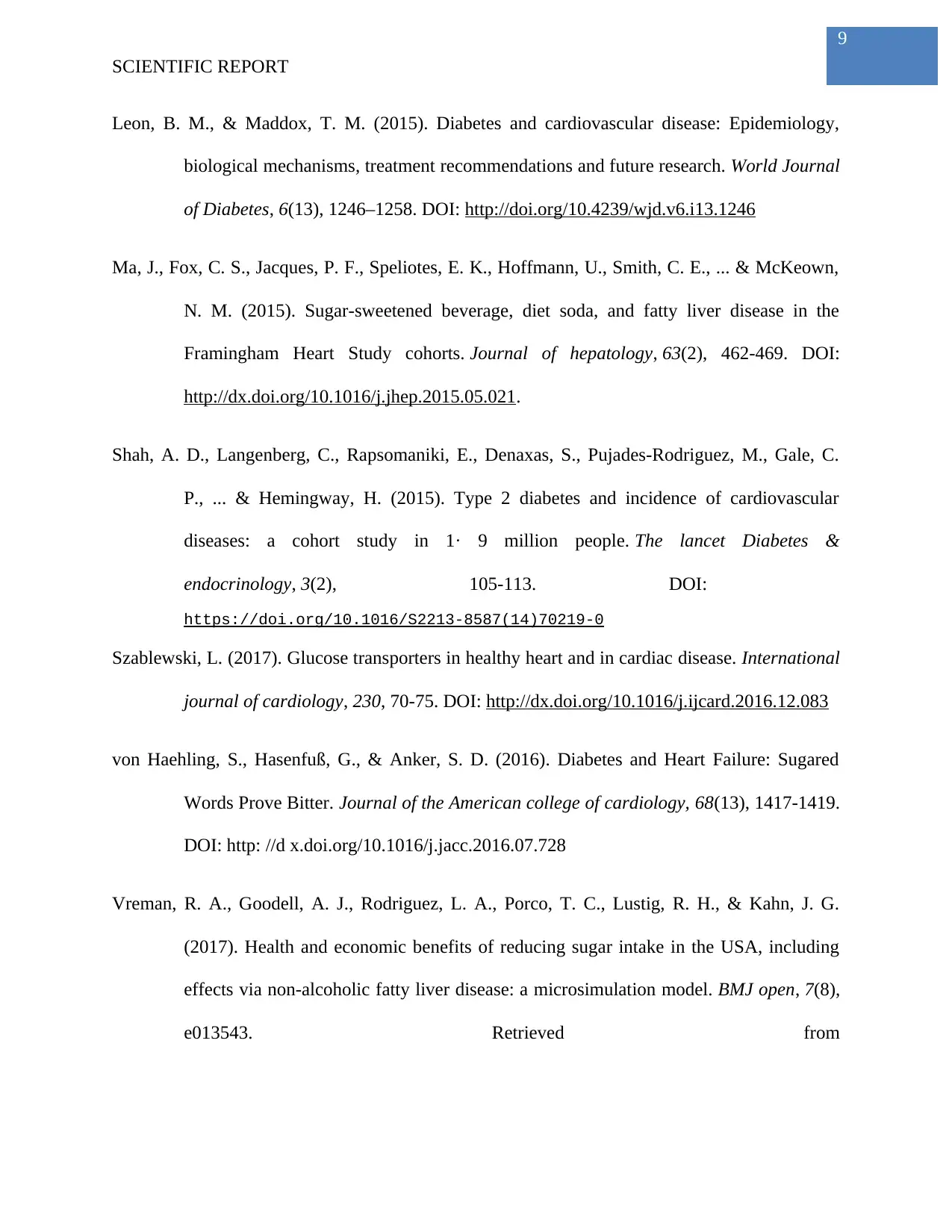
9
SCIENTIFIC REPORT
Leon, B. M., & Maddox, T. M. (2015). Diabetes and cardiovascular disease: Epidemiology,
biological mechanisms, treatment recommendations and future research. World Journal
of Diabetes, 6(13), 1246–1258. DOI: http://doi.org/10.4239/wjd.v6.i13.1246
Ma, J., Fox, C. S., Jacques, P. F., Speliotes, E. K., Hoffmann, U., Smith, C. E., ... & McKeown,
N. M. (2015). Sugar-sweetened beverage, diet soda, and fatty liver disease in the
Framingham Heart Study cohorts. Journal of hepatology, 63(2), 462-469. DOI:
http://dx.doi.org/10.1016/j.jhep.2015.05.021.
Shah, A. D., Langenberg, C., Rapsomaniki, E., Denaxas, S., Pujades-Rodriguez, M., Gale, C.
P., ... & Hemingway, H. (2015). Type 2 diabetes and incidence of cardiovascular
diseases: a cohort study in 1· 9 million people. The lancet Diabetes &
endocrinology, 3(2), 105-113. DOI:
https://doi.org/10.1016/S2213-8587(14)70219-0
Szablewski, L. (2017). Glucose transporters in healthy heart and in cardiac disease. International
journal of cardiology, 230, 70-75. DOI: http://dx.doi.org/10.1016/j.ijcard.2016.12.083
von Haehling, S., Hasenfuß, G., & Anker, S. D. (2016). Diabetes and Heart Failure: Sugared
Words Prove Bitter. Journal of the American college of cardiology, 68(13), 1417-1419.
DOI: http: //d x.doi.org/10.1016/j.jacc.2016.07.728
Vreman, R. A., Goodell, A. J., Rodriguez, L. A., Porco, T. C., Lustig, R. H., & Kahn, J. G.
(2017). Health and economic benefits of reducing sugar intake in the USA, including
effects via non-alcoholic fatty liver disease: a microsimulation model. BMJ open, 7(8),
e013543. Retrieved from
SCIENTIFIC REPORT
Leon, B. M., & Maddox, T. M. (2015). Diabetes and cardiovascular disease: Epidemiology,
biological mechanisms, treatment recommendations and future research. World Journal
of Diabetes, 6(13), 1246–1258. DOI: http://doi.org/10.4239/wjd.v6.i13.1246
Ma, J., Fox, C. S., Jacques, P. F., Speliotes, E. K., Hoffmann, U., Smith, C. E., ... & McKeown,
N. M. (2015). Sugar-sweetened beverage, diet soda, and fatty liver disease in the
Framingham Heart Study cohorts. Journal of hepatology, 63(2), 462-469. DOI:
http://dx.doi.org/10.1016/j.jhep.2015.05.021.
Shah, A. D., Langenberg, C., Rapsomaniki, E., Denaxas, S., Pujades-Rodriguez, M., Gale, C.
P., ... & Hemingway, H. (2015). Type 2 diabetes and incidence of cardiovascular
diseases: a cohort study in 1· 9 million people. The lancet Diabetes &
endocrinology, 3(2), 105-113. DOI:
https://doi.org/10.1016/S2213-8587(14)70219-0
Szablewski, L. (2017). Glucose transporters in healthy heart and in cardiac disease. International
journal of cardiology, 230, 70-75. DOI: http://dx.doi.org/10.1016/j.ijcard.2016.12.083
von Haehling, S., Hasenfuß, G., & Anker, S. D. (2016). Diabetes and Heart Failure: Sugared
Words Prove Bitter. Journal of the American college of cardiology, 68(13), 1417-1419.
DOI: http: //d x.doi.org/10.1016/j.jacc.2016.07.728
Vreman, R. A., Goodell, A. J., Rodriguez, L. A., Porco, T. C., Lustig, R. H., & Kahn, J. G.
(2017). Health and economic benefits of reducing sugar intake in the USA, including
effects via non-alcoholic fatty liver disease: a microsimulation model. BMJ open, 7(8),
e013543. Retrieved from
Paraphrase This Document
Need a fresh take? Get an instant paraphrase of this document with our AI Paraphraser

10
SCIENTIFIC REPORT
https://search-proquest-com.ezproxy.scu.edu.au/docview/1925754279/fulltext/
865E6C63C88F4EE5PQ/9?accountid=16926
SCIENTIFIC REPORT
https://search-proquest-com.ezproxy.scu.edu.au/docview/1925754279/fulltext/
865E6C63C88F4EE5PQ/9?accountid=16926
1 out of 11
Related Documents
Your All-in-One AI-Powered Toolkit for Academic Success.
+13062052269
info@desklib.com
Available 24*7 on WhatsApp / Email
![[object Object]](/_next/static/media/star-bottom.7253800d.svg)
Unlock your academic potential
© 2024 | Zucol Services PVT LTD | All rights reserved.





